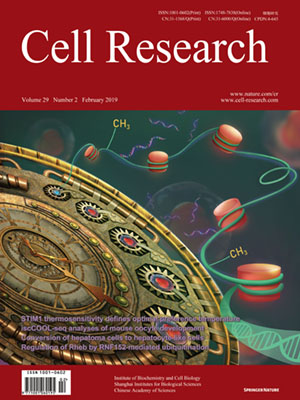
Volume 29, No 2, Feb 2019
ISSN: 1001-0602
EISSN: 1748-7838 2018
impact factor 17.848*
(Clarivate Analytics, 2019)
Volume 29 Issue 2, February 2019: 110-123 | Open Access
ORIGINAL ARTICLES
Integrative single-cell analysis of transcriptome, DNA methylome and chromatin accessibility in mouse oocytes
Chan Gu 1, Shanling Liu 1, Qihong Wu 1, Lin Zhang 1 and Fan Guo 1,2
1 Center for Translational Medicine, Ministry of Education Key Laboratory of Birth Defects and Related Diseases of Women and Children, Department of Obstetrics and Gynecology, West China Second University Hospital, Sichuan University, Chengdu, Sichuan 610041, China and 2 Ministry of Education Key Laboratory of Bio-resource and Ecoenvironment, College of Life Sciences, Sichuan University, Chengdu, Sichuan 610041, China
Correspondence: Correspondence: Fan Guo (guofan@scu.edu.cn)
Oocyte growth is a key step in forming mature eggs that are ready to be fertilized. The states and modifications of chromatin represent critical sources of information for this process. However, the dynamics and interrelations of these chromatin characteristics remain elusive. In this study, we developed an improved scCOOL-seq technique (iscCOOL-seq), which is a multi-omics, single-cell and single-base resolution method with high mapping rates, and explored the chromatin accessibility landscape and its relationship to DNA methylation in growing mouse oocytes. The most dramatic change in chromatin accessibility occurs during oocyte growth initiation, accompanied with prominent transcriptome alterations and an elevated variation in DNA methylation levels among individual oocytes. Unlike CpG islands (CGIs), partially methylated domains (PMDs) are associated with a low density of nucleosome-depleted regions (NDRs) during the whole maturation period. Surprisingly, highly expressed genes are usually associated with NDRs at their transcriptional end sites (TESs). In addition, genes with de novo methylated gene bodies during oocyte maturation are already open at their promoters before oocyte growth initiation. Furthermore, epigenetic and transcription factors that might be involved in oocyte maturation are identified. Our work paves the way for dissecting the complex, yet highly coordinated, epigenetic alterations during mouse oocyte growth and the establishment of totipotency.
https://doi.org/10.1038/s41422-018-0125-4
FULL TEXT | PDF
Browse 1530


